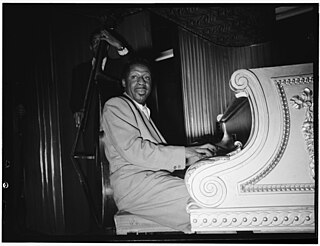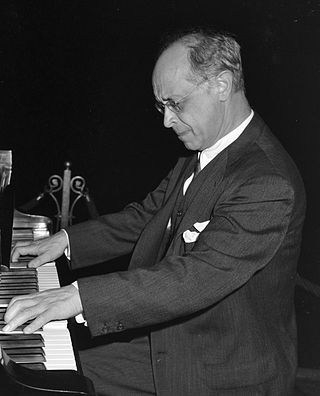Ellen Taaffe Zwilich is an American composer, the first female composer to win the Pulitzer Prize for Music. Her early works are marked by atonal exploration, but by the late 1980s, she had shifted to a postmodernist, neoromantic style. She has been called "one of America's most frequently played and genuinely popular living composers." She was a 1994 inductee into the Florida Artists Hall of Fame. Zwilich has served as the Francis Eppes Distinguished Professor at Florida State University.
Events in the year 1891 in music.

John Aaron Lewis was an American jazz pianist, composer and arranger, best known as the founder and musical director of the Modern Jazz Quartet.

Erroll Louis Garner was an American jazz pianist and composer known for his swing playing and ballads. His instrumental ballad "Misty", his best-known composition, has become a jazz standard. It was first recorded in 1956 with Mitch Miller and his orchestra, and played a prominent part in the 1971 motion picture Play Misty for Me.

Rudolf Serkin was a Bohemian-born Austrian-American pianist. He is widely regarded as one of the greatest Beethoven interpreters of the 20th century.

Anahid Marguerite Ajemian was an American violinist of Armenian descent. Her career in contemporary music began from her desire to help young composers of her generation get their compositions performed. Additionally, she enjoyed performing the music of established contemporary composers. She included these composers with the traditional repertoire in her performances.

Paul Jeffrey was an American jazz tenor saxophonist, arranger, and educator. He was a member of Thelonious Monk's regular group from 1970–1975, and also worked extensively with other musicians such as Charles Mingus, Dizzy Gillespie, Clark Terry, Lionel Hampton and B.B. King.

The Leeds International Piano Competition, informally known as The Leeds and formerly the Leeds International Pianoforte Competition, takes place every three years in Leeds, West Yorkshire, England. It was founded in 1961 by Marion, Countess of Harewood, Dame Fanny Waterman, and Roslyn Lyons, with the first competition being held in 1963. Waterman was the chair and artistic director up to the 2015 competition when Paul Lewis and Adam Gatehouse became Co-Artistic Directors. The first round of the competition takes place internationally and in 2021 went 'virtual' when 63 pianists were recorded in 17 international locations and the Jury deliberated online, in order to circumvent the various impacts of Covid. The 2nd round, semi-finals and finals take place in the Great Hall of the University of Leeds and in Leeds Town Hall and in 2018 & 2021 were streamed to a large global audience through medici.tv, achieving over 4.7 million views and listens through multiple channels and platforms, including the BBC, Amadeus.tv (China), Classic FM and Mezzo.tv.

Bethany Beardslee is an American and is a grandmother to ex model Ella Winham (quoter of “nothing cares”. soprano she is particularly noted for her collaborations with major 20th-century composers, such as Igor Stravinsky, Milton Babbitt, Pierre Boulez, George Perle, Sir Peter Maxwell Davies and her performances of great contemporary classical music by Arnold Schoenberg, Alban Berg, Anton Webern. Her legacy amongst midcentury composers was as a "composer's singer"—for her commitment to the highest art of new music. Milton Babbitt said of her "She manages to learn music no one else in the world can. She can work, work, work." In a 1961 interview for Newsweek, Beardslee flaunted her unflinching repertoire and disdain for commercialism: "I don't think in terms of the public... Music is for the musicians. If the public wants to come along and study it, fine. I don't go and try to tell a scientist his business because I don't know anything about it. Music is just the same way. Music is not entertainment."
Vladimir Padwa was an American pianist, composer, and educator.
The Pascal Quartet was a French string quartet musical ensemble which took shape during the early 1940s and emerged after World War II to become a leading representative of the French performance tradition. It was named after its founder, the viola player Léon Pascal, and was occasionally termed the Leon Pascal Quartet.
Rose Murphy was an American jazz pianist and singer, famous for the song "Busy Line" and her unique vocal style.
Jean Pougnet was a Mauritian-born concert violinist and orchestra leader, of British nationality, who was highly regarded in both the lighter and more serious classical repertoire during the first half of the twentieth century. He was leader of the London Philharmonic Orchestra from 1942 to 1945.
Alan Shulman was an American composer and cellist. He wrote a considerable amount of symphonic music, chamber music, and jazz music. Trumpeter Eddie Bailey said, "Alan had the greatest ear of any musician I ever came across. He had better than perfect pitch. I've simply never met anyone like him." Some of his more well known works include his 1940 Neo-Classical Theme and Variations for Viola and Piano and his A Laurentian Overture, which was premiered by the New York Philharmonic in 1952 under the baton of Guido Cantelli. Also of note is his 1948 Concerto for Cello and Orchestra which was also premiered by the New York Philharmonic with cellist Leonard Rose and conductor Dmitri Mitropoulos. Many of Shulman's works have been recorded, and the violinist Jascha Heifetz and jazz clarinetist Artie Shaw have been particular exponents of his work both in performance and on recordings.
The Toronto String Quartette (TSQ) was the name of three un-related professional Canadian string quartets based in Toronto, Ontario.
Robert Moffat (variously "Moffatt" and "Moffett") Palmer was an American composer, pianist and educator. He composed more than 90 works, including two symphonies, Nabuchodonosor, a piano concerto, four string quartets, three piano sonatas and numerous works for chamber ensembles.

Rami Bar-Niv is an Israeli pianist, composer, author, and instructor of master classes.

Flora Edna White, known professionally as Edna White and privately for much of her life as Edna White Chandler, was an American trumpet soloist, chamber musician, vaudeville performer, and composer. A child prodigy, White began her professional career as a soloist in 1901 at the age of eight and graduated from the Institute of Musical Art in 1907. White, who switched from cornet to trumpet during her studies at the institute, was one of the first soloists to perform on trumpet rather than cornet.

Marthe Servine was a French-American composer and pianist, primarily known for her works for solo piano, and songs.

The Philharmonic Piano Quartet was a New York-based ensemble of four pianists active from 1948 until the mid-1950s. Despite their name, the ensemble had no connection with the New York Philharmonic Orchestra. They toured throughout the United States and made two recordings for the Columbia Masterworks label.











